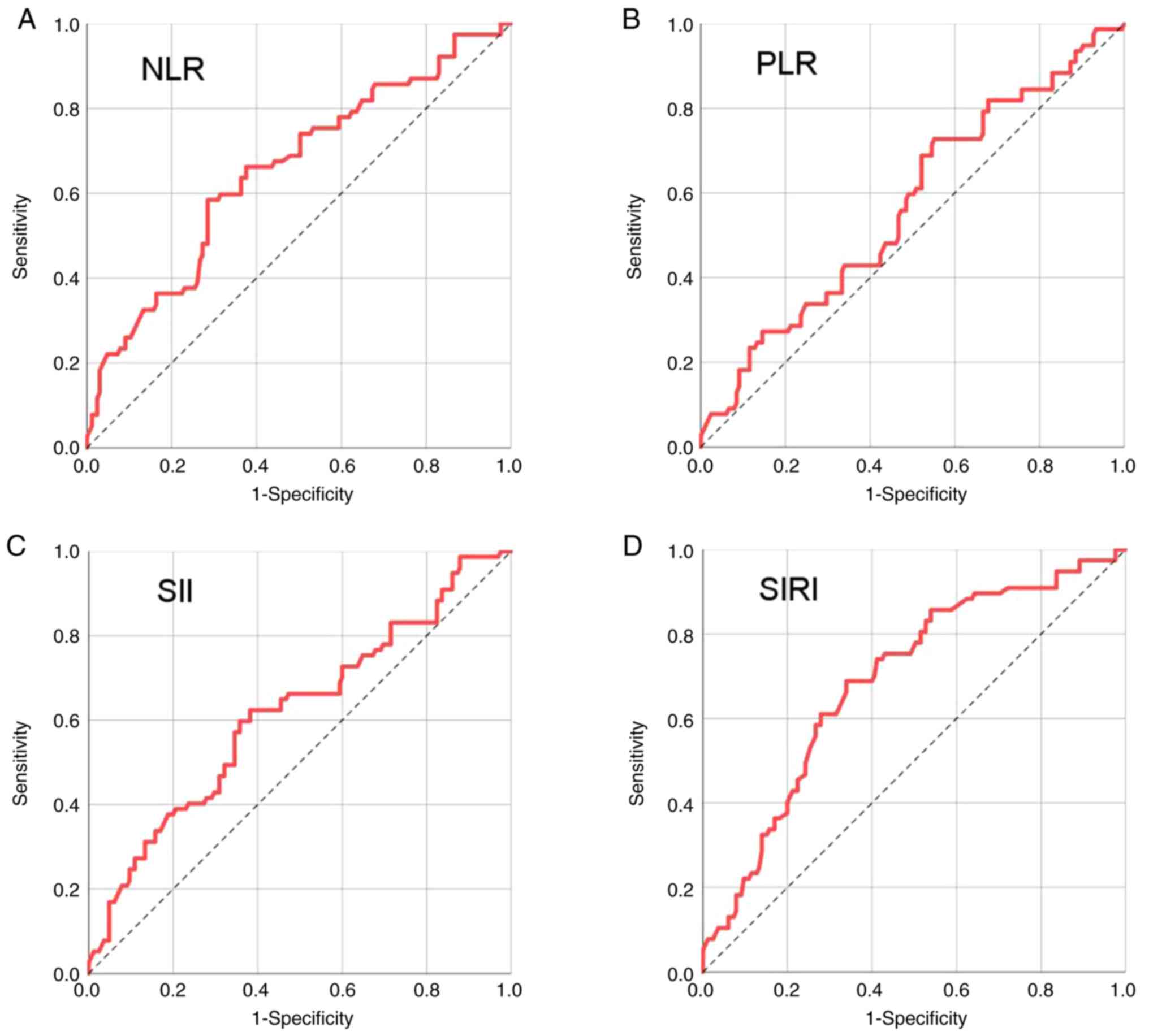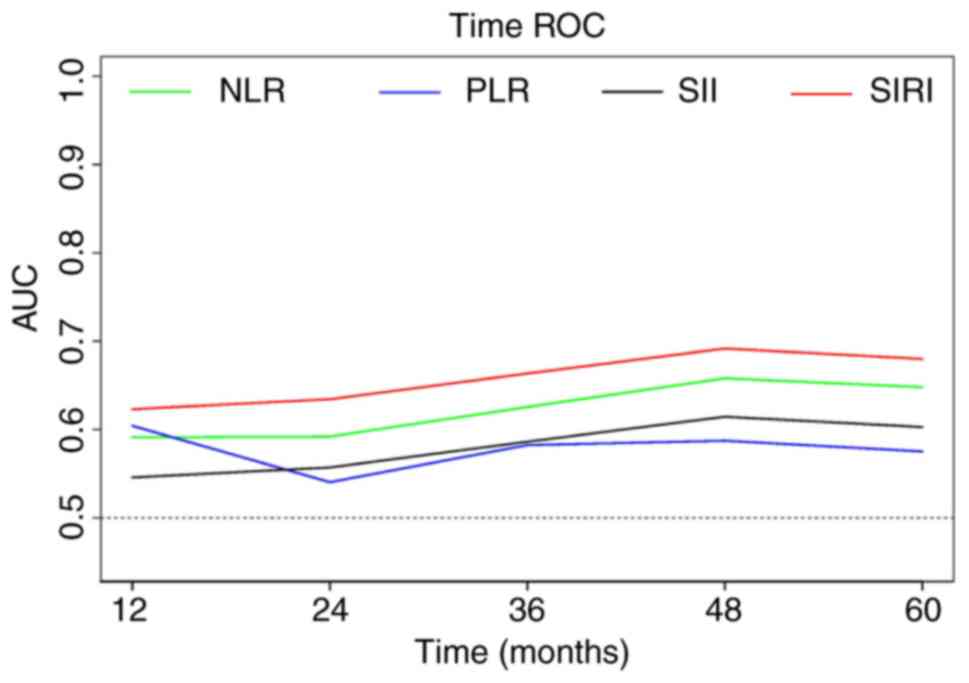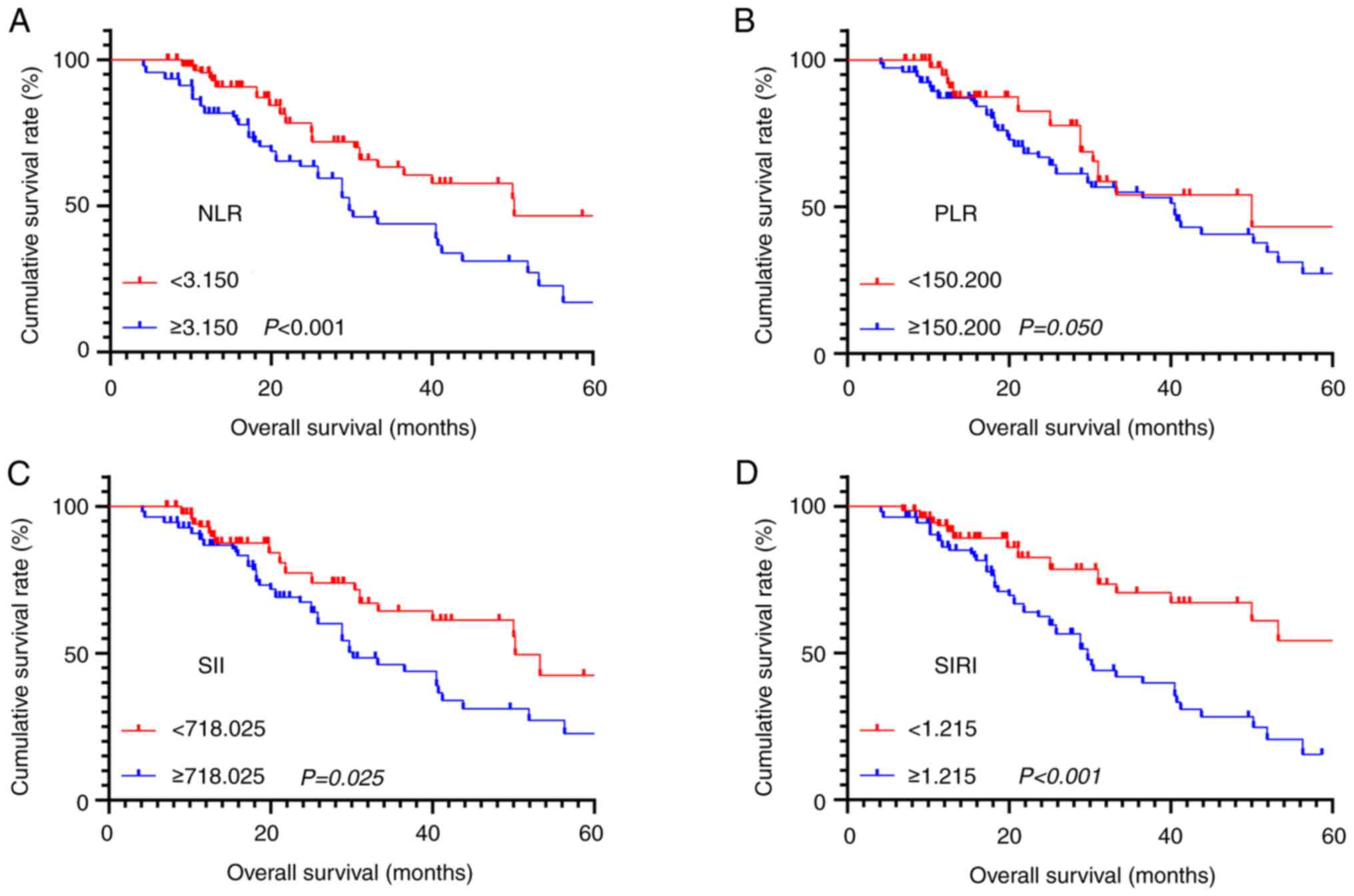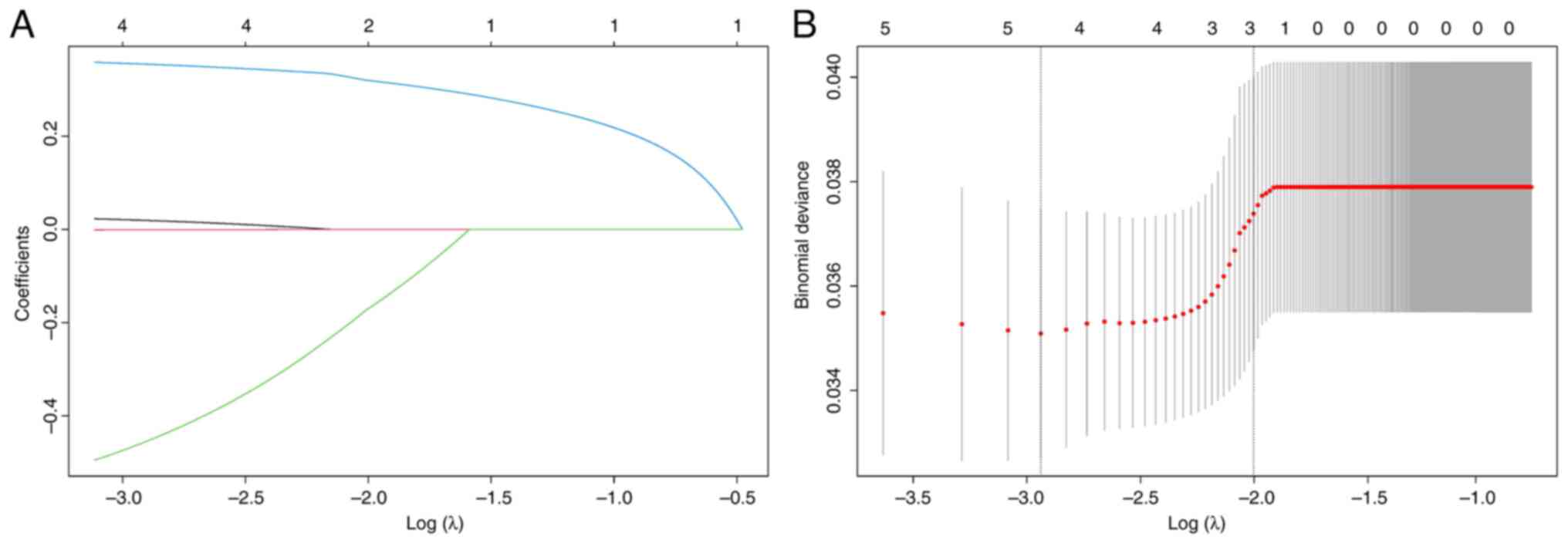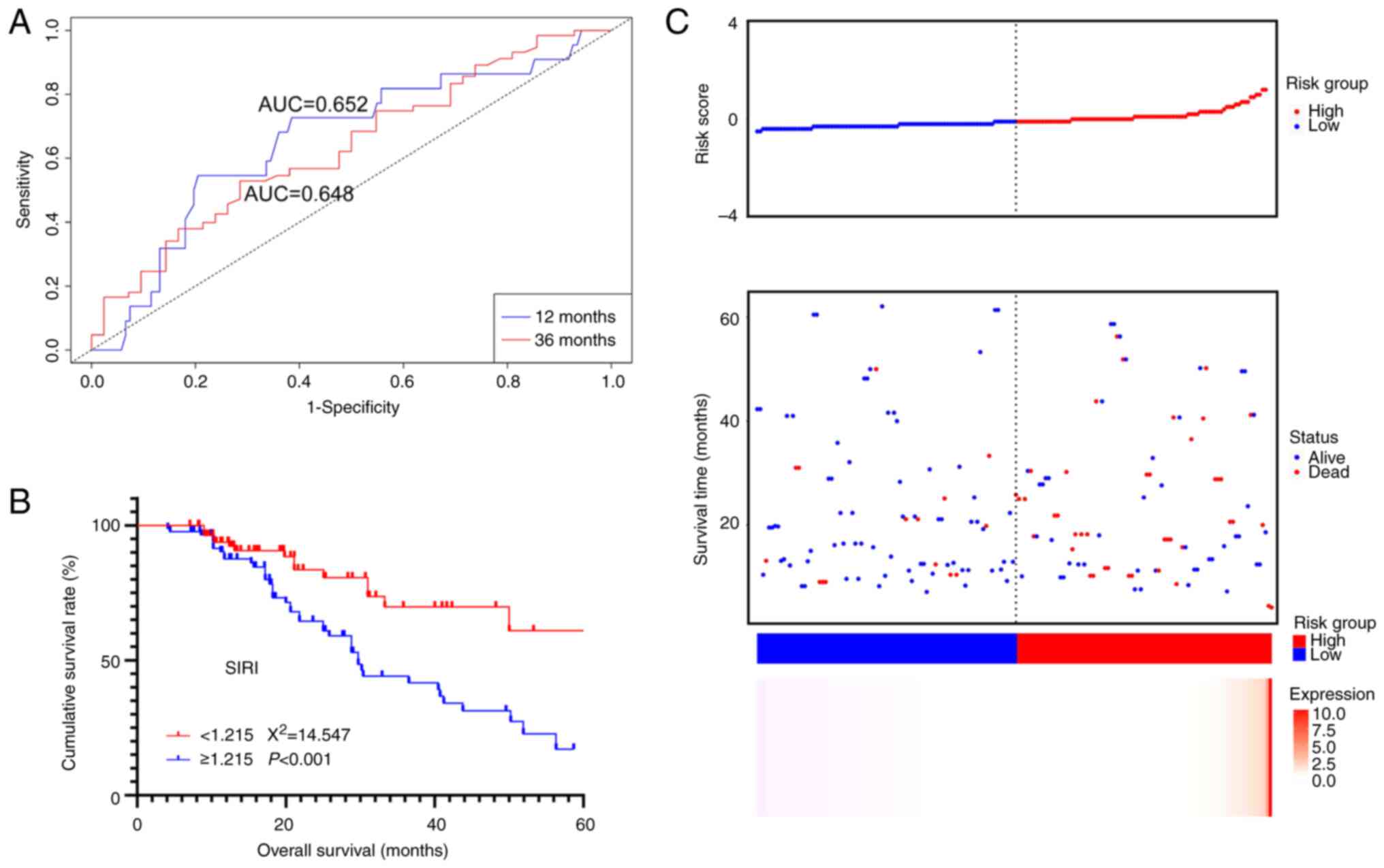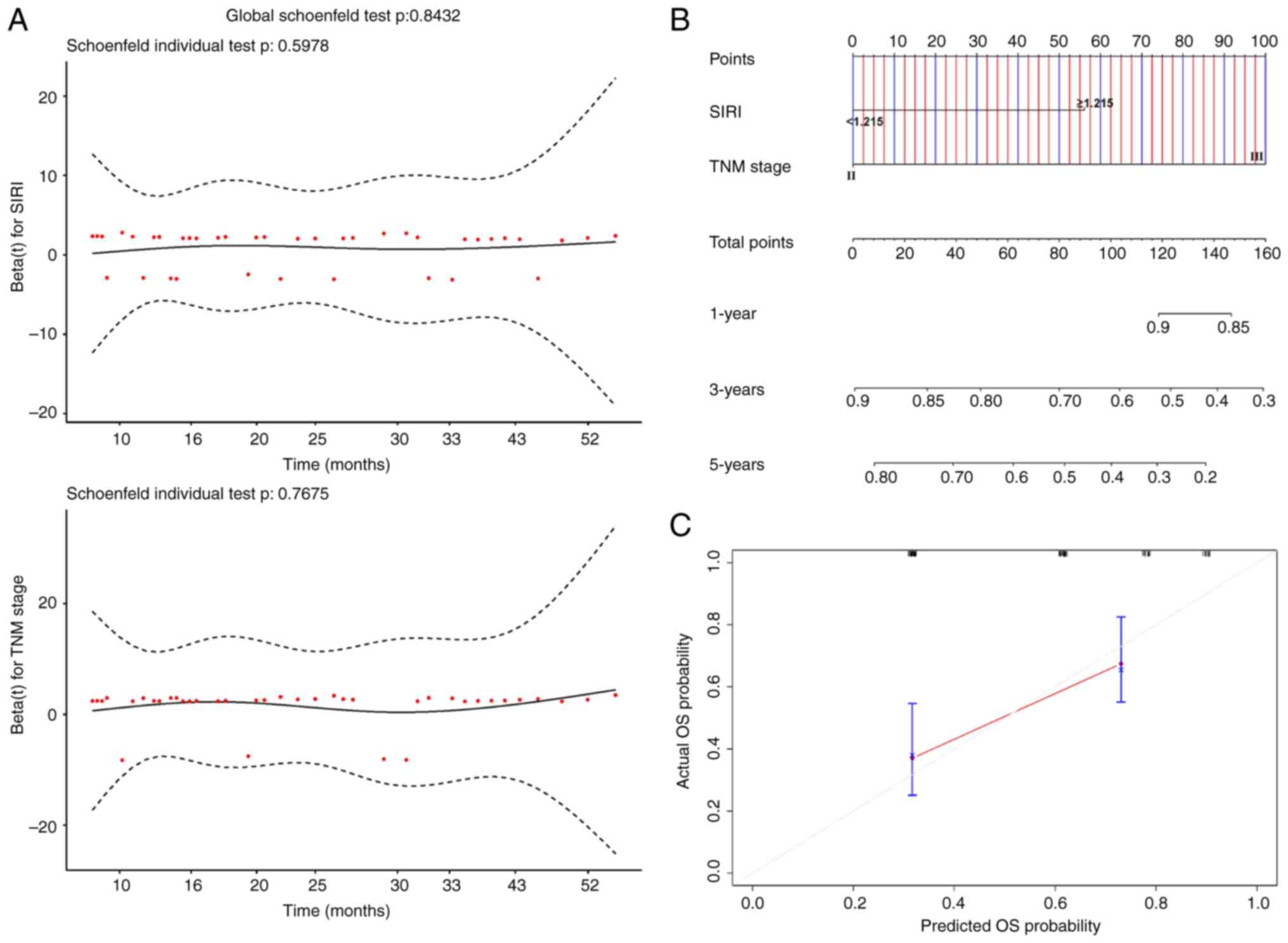|
1
|
López MJ, Carbajal J, Alfaro AL, Saravia
LG, Zanabria D, Araujo JM, Quispe L, Zevallos A, Buleje JL, Cho CE,
et al: Characteristics of gastric cancer around the world. Crit Rev
Oncol Hematol. 181:1038412023. View Article : Google Scholar : PubMed/NCBI
|
|
2
|
Japanese Gastric Cancer Association, .
Japanese gastric cancer treatment guidelines 2021 (6th edition).
Gastric Cancer. 26:1–25. 2023. View Article : Google Scholar : PubMed/NCBI
|
|
3
|
Guan WL, He Y and Xu RH: Gastric cancer
treatment: Recent progress and future perspectives. J Hematol
Oncol. 16:572023. View Article : Google Scholar : PubMed/NCBI
|
|
4
|
Smyth EC, Nilsson M, Grabsch HI, van
Grieken NC and Lordick F: Gastric cancer. Lancet. 396:635–648.
2020. View Article : Google Scholar : PubMed/NCBI
|
|
5
|
Röcken C: Predictive biomarkers in gastric
cancer. J Cancer Res Clin Oncol. 149:467–481. 2023. View Article : Google Scholar : PubMed/NCBI
|
|
6
|
Tan Z: Recent advances in the surgical
treatment of advanced gastric cancer: A review. Med Sci Monit.
25:3537–3541. 2019. View Article : Google Scholar : PubMed/NCBI
|
|
7
|
Tanaka Y, Fujii S, Kusaka T and Kokuryu H:
Gastric mucosal carcinoma with pyloric stenosis. Internal Med.
60:807–808. 2021. View Article : Google Scholar : PubMed/NCBI
|
|
8
|
Iwai N, Okuda T and Kagawa K:
Gastrointestinal: Natural progression of early gastric cancer
causing pyloric stenosis. J Gastroenterol Hepatol. 35:92020.
View Article : Google Scholar : PubMed/NCBI
|
|
9
|
Shimura T, Kataoka H, Sasaki M, Yamada T,
Hayashi K, Togawa S, Okumura F, Kubota E, Ohara H and Joh T:
Feasibility of self-expandable metallic stent plus chemotherapy for
metastatic gastric cancer with pyloric stenosis. J Gastroenterol
Hepatol. 24:1358–1364. 2009. View Article : Google Scholar : PubMed/NCBI
|
|
10
|
Abe S, Kondo H, Sumiyoshi T, Mizushima T,
Sugawara M, Shimizu Y and Okushiba S: Treatment strategy for early
gastric cancer with the risk of pyloric stenosis after endoscopic
resection. Endoscopy. 41:1101–1103. 2009. View Article : Google Scholar : PubMed/NCBI
|
|
11
|
Lee JU, Park MS, Yun SH, Yang MA, Han SH,
Lee YJ, Jung GM, Kim JW, Cho YK and Cho JW: Risk factors and
management for pyloric stenosis occurred after endoscopic
submucosal dissection adjacent to pylorus. Medicine (Baltimore).
95:e56332016. View Article : Google Scholar : PubMed/NCBI
|
|
12
|
Acker SN, Kulungowski AM, Hodges M,
Crombleholme TM, Somme S and Partrick DA: Pyloric
stenosis-postoperative care on a nonsurgical ward. J Surg Res.
199:149–152. 2015. View Article : Google Scholar : PubMed/NCBI
|
|
13
|
Trindade AJ, Sejpal DV and Benias PC:
Palliation of malignant pyloric stenosis using a lumen-apposing
metal stent. Clin Gastroenterol Hepatol. 17:A182019. View Article : Google Scholar : PubMed/NCBI
|
|
14
|
Saeed SM, Bilal S, Siddique MZ, Saqib M,
Shahid S, Ghumman AN and Yusuf MA: Pyloric stent insertion in
malignant gastric outlet obstruction: Moving beyond palliation.
Ther Adv Gastrointest Endosc. 14:263177452110470122021.PubMed/NCBI
|
|
15
|
Jomrich G, Paireder M, Kristo I, Baierl A,
Ilhan-Mutlu A, Preusser M, Asari R and Schoppmann SF: High systemic
immune-inflammation index is an adverse prognostic factor for
patients with gastroesophageal adenocarcinoma. Ann Surg.
273:532–541. 2021. View Article : Google Scholar : PubMed/NCBI
|
|
16
|
Shi H, Wang H, Pan J, Liu Z and Li Z:
Comparing prognostic value of preoperative platelet indexes in
patients with resectable gastric cancer. Sci Rep. 12:64802022.
View Article : Google Scholar : PubMed/NCBI
|
|
17
|
Liu YY, Ruan GT, Ge YZ, Li QQ, Zhang Q,
Zhang X, Tang M, Song MM, Zhang XW, Li XR, et al: Systemic
inflammation with sarcopenia predicts survival in patients with
gastric cancer. J Cancer Res Clin. 149:1249–1259. 2023. View Article : Google Scholar : PubMed/NCBI
|
|
18
|
He K, Si L, Pan X, Sun L, Wang Y, Lu J and
Wang X: Preoperative systemic immune-inflammation index (SII) as a
superior predictor of long-term survival outcome in patients with
stage I–II gastric cancer after radical surgery. Front Oncol.
12:8296892022. View Article : Google Scholar : PubMed/NCBI
|
|
19
|
Ding P, Guo H, Sun C, Yang P, Kim NH, Tian
Y, Liu Y, Liu P, Li Y and Zhao Q: Combined systemic
immune-inflammatory index (SII) and prognostic nutritional index
(PNI) predicts chemotherapy response and prognosis in locally
advanced gastric cancer patients receiving neoadjuvant chemotherapy
with PD-1 antibody sintilimab and XELOX: A prospective study. BMC
Gastroenterol. 22:1212022. View Article : Google Scholar : PubMed/NCBI
|
|
20
|
Li P, Huang CM, Zheng CH, Russo A,
Kasbekar P, Brennan MF, Coit DG and Strong VE: Comparison of
gastric cancer survival after R0 resection in the US and China. J
Surg Oncol. 118:975–982. 2018. View Article : Google Scholar : PubMed/NCBI
|
|
21
|
Meng Q, Tan S, Jiang Y, Han J, Xi Q,
Zhuang Q and Wu G: Post-discharge oral nutritional supplements with
dietary advice in patients at nutritional risk after surgery for
gastric cancer: A randomized clinical trial. Clin Nutr. 40:40–46.
2021. View Article : Google Scholar : PubMed/NCBI
|
|
22
|
Miao X, Ding L, Hu J, Zhu H, Zhao K, Lu J,
Jiang X, Xu Q and Zhu S: A web-based calculator combining geriatric
nutritional risk index (GNRI) and tilburg frailty indicator (TFI)
predicts postoperative complications among young elderly patients
with gastric cancer. Geriatr Gerontol Int. 23:205–212. 2023.
View Article : Google Scholar : PubMed/NCBI
|
|
23
|
Ruan GT, Zhang Q, Zhang X, Tang M, Song
MM, Zhang XW, Li XR, Zhang KP, Ge YZ, Yang M, et al: Geriatric
nutrition risk index: Prognostic factor related to inflammation in
elderly patients with cancer cachexia. J Cachexia Sarcopenia
Muscle. 12:1969–1982. 2021. View Article : Google Scholar : PubMed/NCBI
|
|
24
|
Sun H, Chen L, Huang R, Pan H, Zuo Y, Zhao
R, Xue Y and Song H: Prognostic nutritional index for predicting
the clinical outcomes of patients with gastric cancer who received
immune checkpoint inhibitors. Front Nutr. 9:10381182022. View Article : Google Scholar : PubMed/NCBI
|
|
25
|
Zhang L, Ma W, Qiu Z, Kuang T, Wang K, Hu
B and Wang W: Prognostic nutritional index as a prognostic
biomarker for gastrointestinal cancer patients treated with immune
checkpoint inhibitors. Front Immunol. 14:12199292023. View Article : Google Scholar : PubMed/NCBI
|
|
26
|
Jiao X, Wang Y, Qu X, Qu J and Wang X:
Effects of preoperative pyloric stenosis on outcomes and
nutritional status in 73 patients following curative gastrectomy
for gastric cancer: A retrospective study from a single center. Med
Sci Monit. 27:e9309742021. View Article : Google Scholar : PubMed/NCBI
|
|
27
|
Li G, He L and Sun H: Nutritional risk
index predicts the prognosis of gastric cancer patients with
pyloric stenosis who received preoperative parenteral nutrition.
Oncol Lett. 26:4012023. View Article : Google Scholar : PubMed/NCBI
|
|
28
|
Hashimoto K, Nishimura S, Shinyashiki Y,
Ito T and Akagi M: Characterizing inflammatory markers in highly
aggressive soft tissue sarcomas. Medicine (Baltimore).
101:e306882022. View Article : Google Scholar : PubMed/NCBI
|
|
29
|
Zurlo IV, Schino M, Strippoli A, Calegari
MA, Cocomazzi A, Cassano A, Pozzo C, Di Salvatore M, Ricci R,
Barone C, et al: Predictive value of NLR, TILs
(CD4+/CD8+) and PD-L1 expression for
prognosis and response to preoperative chemotherapy in gastric
cancer. Cancer Immunol Immunother. 71:45–55. 2022. View Article : Google Scholar : PubMed/NCBI
|
|
30
|
Wu J, Wu XD and Gao Y and Gao Y:
Correlation between preoperative systemic immune-inflammatory
indexes and the prognosis of gastric cancer patients. Eur Rev Med
Pharmacol Sci. 27:5706–5720. 2023.PubMed/NCBI
|
|
31
|
Qiu Y, Zhang Z and Chen Y: Prognostic
value of pretreatment systemic immune-inflammation index in gastric
cancer: A meta-analysis. Front Oncol. 11:5371402021. View Article : Google Scholar : PubMed/NCBI
|
|
32
|
Venet F and Monneret G: Advances in the
understanding and treatment of sepsis-induced immunosuppression.
Nat Rev Nephrol. 14:121–137. 2018. View Article : Google Scholar : PubMed/NCBI
|
|
33
|
Xia L, Oyang L, Lin J, Tan S, Han Y, Wu N,
Yi P, Tang L, Pan Q, Rao S, et al: The cancer metabolic
reprogramming and immune response. Mol Cancer. 20:282021.
View Article : Google Scholar : PubMed/NCBI
|
|
34
|
Chen DS and Mellman I: Elements of cancer
immunity and the cancer-immune set point. Nature. 541:321–330.
2017. View Article : Google Scholar : PubMed/NCBI
|
|
35
|
van Weverwijk A and de Visser KE:
Mechanisms driving the immunoregulatory function of cancer cells.
Nat Rev Cancer. 23:193–215. 2023. View Article : Google Scholar : PubMed/NCBI
|
|
36
|
Andrejeva G and Rathmell JC: Similarities
and distinctions of cancer and immune metabolism in inflammation
and tumors. Cell Metab. 26:49–70. 2017. View Article : Google Scholar : PubMed/NCBI
|
|
37
|
Vinay DS, Ryan EP, Pawelec G, Talib WH,
Stagg J, Elkord E, Lichtor T, Decker WK, Whelan RL, Kumara HMCS, et
al: Immune evasion in cancer: Mechanistic basis and therapeutic
strategies. Semin Cancer Biol. 35 (Suppl 35):S185–S198. 2015.
View Article : Google Scholar : PubMed/NCBI
|
|
38
|
Fang T, Wang Y, Yin X, Zhai Z, Zhang Y,
Yang Y, You Q, Li Z, Ma Y, Li C, et al: Diagnostic sensitivity of
NLR and PLR in early diagnosis of gastric cancer. J Immunol Res.
2020:91460422020. View Article : Google Scholar : PubMed/NCBI
|
|
39
|
Cupp MA, Cariolou M, Tzoulaki I, Aune D,
Evangelou E and Berlanga-Taylor AJ: Neutrophil to lymphocyte ratio
and cancer prognosis: An umbrella review of systematic reviews and
meta-analyses of observational studies. BMC Med. 18:3602020.
View Article : Google Scholar : PubMed/NCBI
|
|
40
|
Hirahara T, Arigami T, Yanagita S,
Matsushita D, Uchikado Y, Kita Y, Mori S, Sasaki K, Omoto I,
Kurahara H, et al: Combined neutrophil-lymphocyte ratio and
platelet-lymphocyte ratio predicts chemotherapy response and
prognosis in patients with advanced gastric cancer. BMC Cancer.
19:6722019. View Article : Google Scholar : PubMed/NCBI
|
|
41
|
Ye Z, Yu P, Cao Y, Chai T, Huang S, Cheng
X and Du Y: Prediction of Peritoneal cancer index and prognosis in
peritoneal metastasis of gastric cancer using NLR-PLR-DDI score: A
retrospective study. Cancer Manag Res. 14:177–187. 2022. View Article : Google Scholar : PubMed/NCBI
|
|
42
|
Ikegame A, Kondo A, Kitaguchi K, Sasa K
and Miyoshi M: Presepsin production in monocyte/macrophage-mediated
phagocytosis of neutrophil extracellular traps. Sci Rep.
12:59782022. View Article : Google Scholar : PubMed/NCBI
|
|
43
|
Fendl B, Berghoff AS, Preusser M and Maier
B: Macrophage and monocyte subsets as new therapeutic targets in
cancer immunotherapy. ESMO Open. 8:1007762023. View Article : Google Scholar : PubMed/NCBI
|
|
44
|
Que H, Fu Q, Lan T, Tian X and Wei X:
Tumor-associated neutrophils and neutrophil-targeted cancer
therapies. Biochim Biophys Acta Rev Cancer. 1877:1887622022.
View Article : Google Scholar : PubMed/NCBI
|
|
45
|
MacPherson S, Kilgour M and Lum JJ:
Understanding lymphocyte metabolism for use in cancer
immunotherapy. FEBS J. 285:2567–2578. 2018. View Article : Google Scholar : PubMed/NCBI
|
|
46
|
Pan JH, Zhou H, Cooper L, Huang JL, Zhu
SB, Zhao XX, Ding H, Pan YL and Rong L: LAYN is a prognostic
biomarker and correlated with immune infiltrates in gastric and
colon cancers. Front Immunol. 10:62019. View Article : Google Scholar : PubMed/NCBI
|
|
47
|
Wang Q, Li S, Qiao S, Zheng Z, Duan X and
Zhu X: Changes in T lymphocyte subsets in different tumors before
and after radiotherapy: A meta-analysis. Front Immunol.
12:6486522021. View Article : Google Scholar : PubMed/NCBI
|
|
48
|
Soldati L, Di Renzo L, Jirillo E, Ascierto
PA, Marincola FM and De Lorenzo A: The influence of diet on
anti-cancer immune responsiveness. J Transl Med. 16:752018.
View Article : Google Scholar : PubMed/NCBI
|
|
49
|
Matsunaga T, Miyata H, Sugimura K, Motoori
M, Asukai K, Yanagimoto Y, Takahashi Y, Tomokuni A, Yamamoto K,
Akita H, et al: Prognostic significance of sarcopenia and systemic
inflammatory response in patients with esophageal cancer.
Anticancer Res. 39:449–458. 2019. View Article : Google Scholar : PubMed/NCBI
|
|
50
|
Liu Z, Jin K, Guo M, Long J, Liu L, Liu C,
Xu J, Ni Q, Luo G and Yu X: Prognostic value of the CRP/Alb ratio,
a novel inflammation-based score in pancreatic cancer. Ann Surg
Oncol. 24:561–568. 2017. View Article : Google Scholar : PubMed/NCBI
|
|
51
|
Liu JX, Li A, Zhou LY, Liu XF, Wei ZH,
Wang XZ and Ying HQ: Significance of combined preoperative serum
Alb and dNLR for diagnosis of pancreatic cancer. Future Oncol.
14:229–239. 2018. View Article : Google Scholar : PubMed/NCBI
|
|
52
|
Stumpf F, Keller B, Gressies C and Schuetz
P: Inflammation and nutrition: Friend or foe? Nutrients.
15:11592023. View Article : Google Scholar : PubMed/NCBI
|















